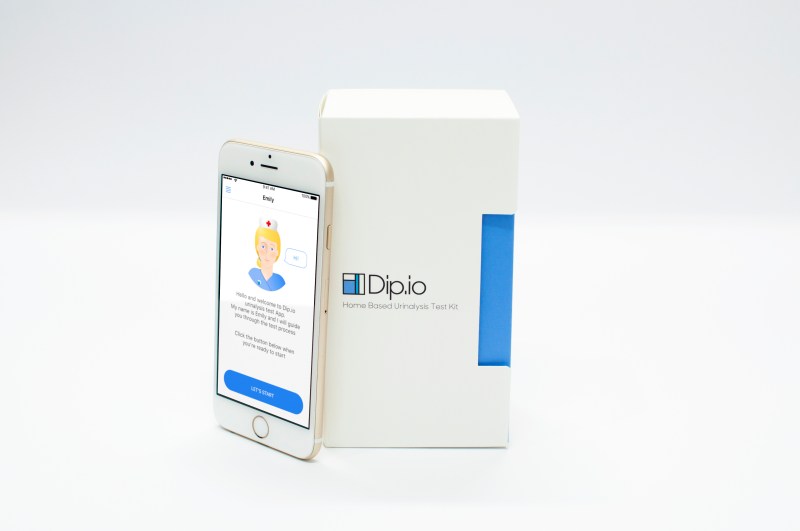Watch all the Transform 2020 sessions on-demand here.
Chronic kidney disease (CKD) is a killer. It’s the ninth leading cause of death in the U.S., where an estimated 31 million people — 10 percent of the adult population — have been diagnosed. Unsurprisingly, the associated medical costs are astronomical: Medicare spends an estimated $114 billion treating CKD patients.
This sordid state of affairs motivated Yonatan Adiri, previously chief technology officer for former Israeli President Shimon Peres, to cofound Healthy.io, a six-year-old digital health care startup that’s leveraging smartphones and computer vision to offer the benefits of professional-grade medical imaging at home to those with CKD. Its digital testing kit — Dip.io — enables patients to collect and analyze urine samples with nothing more than a smartphone app, a dip stick, and a color-coded slide.
Healthy.io today announced that it has raised $18 million in series B funding led by Aleph, with participation from Samsung’s Next and individual investors. The fresh capital — which brings the Tel Aviv startup’s total raised to $30 million — will be used to “scale operations” in the U.K. and roll out service in the U.S, said Adiri, who serves as CEO.
“We are reinventing existing paradigms of prevention,” he said. “Instead of spending money and other resources to get people to come to the lab, we offer providers a full home-based service. With our ‘pay per protein’ model, we only get paid based on tangible cost improvements we deliver by detecting elevated protein in urine — which identifies previously undetected [CKD].”
June 5th: The AI Audit in NYC
Join us next week in NYC to engage with top executive leaders, delving into strategies for auditing AI models to ensure fairness, optimal performance, and ethical compliance across diverse organizations. Secure your attendance for this exclusive invite-only event.
Dip.io was designed with ease of use in mind. Patients wait for the colors on the included dipstick to develop and snap a picture of it against a card with the companion smartphone app, after which the image is anonymized, tokenized, and beamed to the cloud for diagnostic tests. The medical-grade CE and ISO 13485 certified-for-sale kit performs urinalysis for a range of illnesses, infections, and pregnancy-related complications. Specifically, it tests for ketones, leukocytes, nitrites, glucose, protein, blood, specific gravity, bilirubin, urobilinogen, and pH — markers that span pathologies from urinary tract infections to ketosis, kidney disease, pregnancy health, and bladder cancer.

For patients, the benefits are obvious: Taking pictures of urine samples is much less laborious than driving to a nearby hospital. As for clinicians, at-home tests like Dip.io thin out waiting rooms and help hospital staff prioritize urgent cases. “If you look at the exponential growth around the smartphone camera … it makes sense to leverage this growth to [use] it for diagnostic purposes,” Adiri told VentureBeat in an earlier interview. “[Patients] don’t have to go to the lab anymore.”
Dip.io is highly effective, Adiri adds — both at encouraging patients to test themselves regularly and at revealing signs of kidney dysfunction. In a triple-blind study with 500 subjects, 99 percent of people were able to complete a test. And in an assessment of patients with hypertension conducted with Geisinger Health in conjunction with the U.S. National Kidney Foundation, adherence rates were 71 percent.
Separately, in the U.K., where Dip.io is available through a virtual renal clinic program launched in June by an NHS clinic in Yorkshire, 10 percent of patients who took the test were found to have elevated levels of protein, indicating a previously unknown kidney disease.
“We know that most patients with kidney disease and protein in their urine are untested and therefore go undiagnosed,” Dr. Joe Coresh, professor of epidemiology, medicine, and biostatistics at Johns Hopkins University, who heads Healthy.io’s clinical advisory board, said. “[This] technology — [which] directly [connects] patients at home with the medical system — is a gamechanger addressing a big need.”
Dip.io is already being used by 100,000 patients via Healthy.io’s strategic partnerships in Europe and Israel, Adiri says, and has secured an FDA 510(k) clearance in the U.S. The company has also inked a global partnership with Siemens Healthineers, and it recently announced the launch of a cystitis testing service in more than three dozen Boots UK stores in London, Sheffield, and Cardiff. (Boots UK is a subsidiary of Walgreens parent company Walgreens Boots Alliance.)
Healthy.io’s currently focused on international expansion, Adiri says, but its offerings won’t be limited to urinalysis tests in the future. The startup’s in-development dermatological product has patients stick a plaster with colored hexagons near a patch of skin and snap a photo with a smartphone app. Computer vision algorithms correct and standardize the image, and, as with Dip.io, send it to the cloud for analysis.
“We are thrilled to partner with Yonatan and the Healthy.io team,” Michael Eisenberg, partner at Aleph, said. “We are inspired by the company’s mission to prevent kidney disease complications, improve ease and quality of care, and ultimately, save lives. We believe that Healthy.io will dramatically reduce the cost of healthcare while increasing quality disease prevention.”


